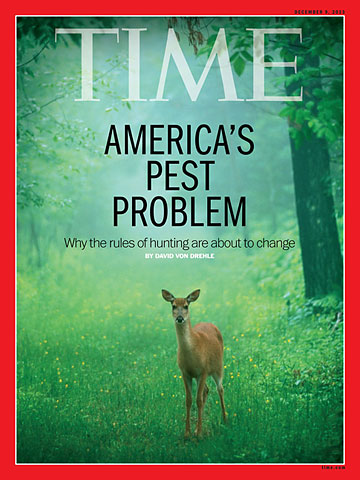
(6 of 7)
If we don't do it, who will? The unprecedented numbers of large mammals now roaming the U.S. are sending a powerful natural summons to an unwelcome alternative: the resurgent apex predators that occupy the top of the food chain. The wolf, the cougar and the brown and grizzly bears ranged across most of the North American continent before humans nearly wiped them out. Now they too are rapidly returning. According to veteran wildlife biologist Maurice Hornocker, "there may now be more mountain lions in the West than there were before European settlement," and cougars have been spotted in recent years in Eastern states where they hadn't been seen for generations. Gray wolves have rebounded so robustly from near destruction that the U.S. Fish and Wildlife Service is proposing to remove them from the protected list of endangered and threatened species. And some scientists theorize that the resurgence of grizzly bears in the wilderness helps explain why black bears are now suburbanites. They've been pushed closer to the humans by their bigger, more aggressive cousins.
The return of alpha predators is sure to remind us of the reasons these beasts were so relentlessly hunted by our forefathers. Wolves, lions and bears are known to attack livestock and even pets. On rare occasions, they have killed humans. So what can keep them away from our neighborhoods? Only the pushback from the No. 1 predator of them all: the human being. Well-planned hunting can safely reduce the wildlife populations to levels that won't invite an invasion of fangs and claws.
There are signs that Americans may be embracing this responsibility. According to the Fish and Wildlife Service, hunting gained in popularity from 2006 to 2011--the most recent available data. That was the first uptick in decades, and it included a record 1.8 million hunters ages 6 to 15. The enthusiasm isn't universal: in South Dakota, 21% of the population hunts; in Massachusetts, it's only 1%.
But whether we hoist the gun or draw the bowstring--or simply acknowledge the facts of nature that require these things to be done--it's time to shake off sentimentality and see responsible hunting through 21st century eyes. The legacy of indiscriminate 19th century slaughter is not a burden for today's hunters to carry. Instead, they are an important part of the ecosystem America has successfully nursed back from the brink. By shouldering the role of careful, conservation-minded predators, hunters make the coexistence of humans and wildlife sustainable.
The communities I mentioned at the start of this article--places like Durham, N.C., and Rock Island, Ill.--have embraced the role of hunters in their local ecology reluctantly. Durham Mayor Bill Bell isn't sure that opening the city to bow hunting will accomplish much, he told TIME. Yes, he has noticed more deer on the roads. "I'm more cautious when I drive into my neighborhood now," he said. "I know if I round a bend, there might be three or four deer attempting to cross the road. Other folks have similar experiences." But whether hunting is the answer "remains to be seen," he said. "I'm not even speculating."
